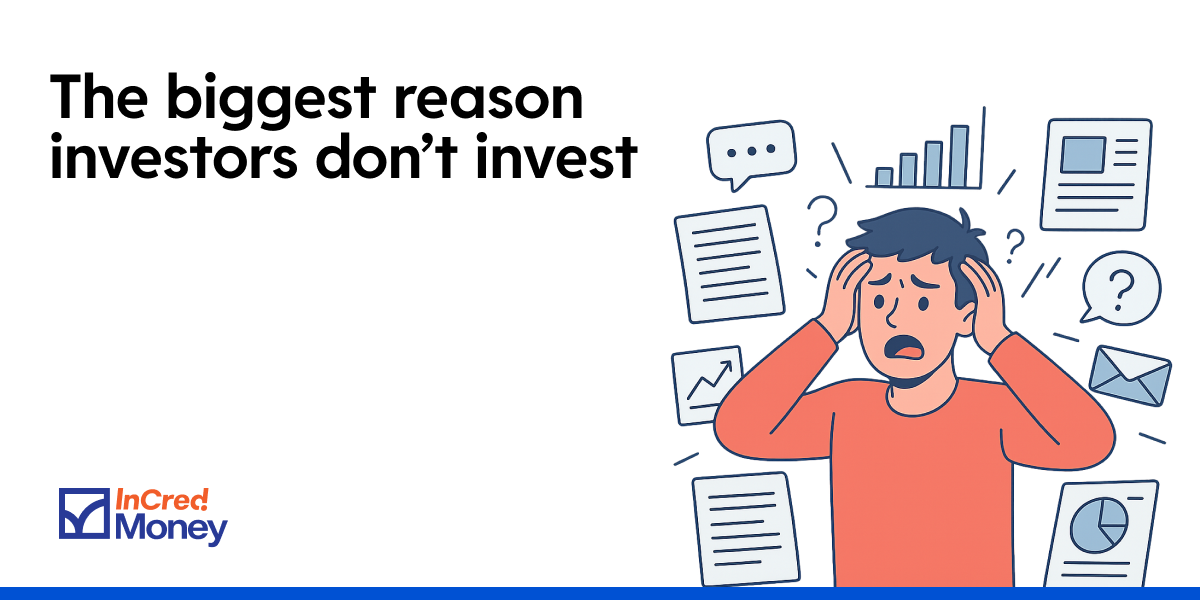A few weeks ago, I went to buy a new television. It sounded like a simple enough errand; walk in, pick a reliable brand, and be done with it.
But the moment I stepped into the store, I was met with a wall of screens. Dozens of brands with a few new names I hadn’t even heard of — all promising the “best picture quality.” Each had some special feature or technology that seemed worth considering.
And the choices didn’t stop there. The salesperson started explaining payment options — zero-cost EMIs, instant bank discounts, cashback on select cards. Then came extended warranties, wall mounts, and smart remotes.
The more information I got, the more confusing it became. Was I making the right choice? Was I missing a better deal? After a long round of comparisons, I finally bought one, but walked out wondering if I’d made the right decision.
Too many choices had turned a simple purchase into a stressful one.
Now, imagine the same experience… but with your investments.
You open a mutual fund app to invest. What should have been straightforward, picking a good fund, suddenly feels just as complicated. There are thousands of schemes: large cap, mid cap, balanced, thematic, tax-saving. Each one comes with ratings, charts, and expert opinions.
You start researching, but soon realize the real challenge isn’t finding a fund that has performed well, it’s figuring out which one will perform well in the future. Fund managers change, market cycles shift, and yesterday’s top fund might not even make the list tomorrow.
So, like in that electronics store, you hesitate. You tell yourself you’ll come back later, and often, you never do.
Why more choices don’t mean better outcomes
We love the idea of having options. It feels like freedom. But when there are too many, our brains start to short-circuit.
Here’s what happens:
- We freeze. The fear of making the wrong choice makes us avoid choosing at all.
- We regret. Even after deciding, we keep wondering if another option was better.
- We feel less satisfied. Ironically, the more time we spend comparing, the less happy we are with our final pick.
In the world of investing, this shows up all the time. We open apps, read blogs, watch videos, but don’t invest. Or we invest, and then keep second-guessing ourselves when another fund performs better.
Choice overload makes us believe we’re being careful, but often, it just leads to procrastination.
The truth is: more options doesn’t make us better investors, it makes us more confused ones.
Psychologist Barry Schwartz summed it up perfectly in The Paradox of Choice:
“Learning to choose is hard. Learning to choose well is harder. And learning to choose well in a world of unlimited possibilities is harder still — perhaps too hard.”
When choice turns into overload, the result isn’t empowerment — it’s inaction.
Making wealth through simplicity
The best investors don’t try to pick every winning option. They design a system that helps them make good decisions consistently.
Here’s how you can simplify:
- Start With Your Goal, Not the Product
Don’t begin with “Which mutual fund is best?” Start with “What am I investing for?” short-term safety, long-term growth, or regular income. The answer narrows your choices instantly. - Fix your Asset Allocation
Before picking any fund, decide how much of your money should go into equity, debt, and gold. Asset allocation acts like a map — it tells you where to look and what to ignore. Once this is set, choosing individual funds becomes much easier. - Automate Where You Can SIPs
Remove the pressure of timing the market. Once set, you’re free from daily decision fatigue. - Be a Satisficer, Not a Maximizer
Don’t chase the best fund. Choose what’s good enough to meet your goals — and stay consistent. If you’re confused about which fund manager to choose, just opt for a passive fund!
The Takeaway
Decision fatigue is real. Every small choice: what to wear, what to eat, where to invest, chips away at our mental energy.
Even Steve Jobs, one of the greatest innovators of our time, famously wore the same black turtleneck and jeans every day. He didn’t want to waste his focus on trivial decisions, he wanted to save it for what truly mattered.
He wasn’t alone. Mark Zuckerberg stuck to his grey T-shirts, and Barack Obama limited himself to just two suit colours, all for the same reason: to avoid decision fatigue and focus on what really counts.
The same principle applies to money. The more we simplify our financial lives, the better our decisions become. Clarity doesn’t come from having more options — it comes from removing the unnecessary ones.
If you enjoyed this newsletter, feel free to share it with your friends and family using the link below.
Also, if you have any topics that you would like us to cover or any other feedback, do write to us at connect@incredmoney.com
Till the next time,
Vijay
CEO – InCred Money




